The Coach House A short story by Martin Bradley
C
hiswick, West London, held particular memories for the now middle-aged Blicton-on-Sea lad, Colin Baker. Those stolen weekends with Uncle Bill and Aunt Ivy in particular. As Colin was growing (in the early 1960s), every now and then his parents, having had enough of parenting, would shove Colin onto a train from the small Essex seaside town of Blicton-on-Sea in the general hope that he might arrive at Liverpool Street Station (London) not too frazzled an hour-and-a-half later.
craft some forty- five years earlier at Blicton School of Art & Design. It was in those scarce remembered days when ‘cut and paste’ was, quite literally, just that). Secondary-school boy Colin, with a decent size chip on his working-class shoulder, could not believe his luck when his social media friend ‘Nushy’ (Indian artist et al aka Nushrratt Bose) had, while staying for a short spell in London, introduced him, virtually, to ‘The London Monthly Repository’ magazine (founded 1806).
Soon after, Colin had been tactfully summoned Generally Colin, who had soon deciphered to The Coach House, Rupert Street, Chiswick the intricacies of Harry Beck’s London Tube (with its captivating Georgian architecture), by Map (at twelve), could navigate his way via the former Public-school boy Roger Percy, architect Circle Line (from Liverpool Street), changing (FRIBA), owner and occasional Chief Editor at Gloucester Road and finish his journey at of the aforementioned prestigious literary Turnham Green Tube station on the District Line. magazine. Ostensibly, it was for Roger to attend It was there that, inevitably, partially bald, lanky the celebration of Mid Summer via a garden and ramrod straight Uncle Bill would greet him party for ‘The London Monthly Repository’ its with a big smile, while Aunt Ivy would be busy friends and supporters. Guess who was Oberon putting the kettle on for ‘a nice cuppa tea’ or and who was Bottom. Actually there is no need three. to guess, that was rhetorical. Uncle Bill was every inch the Scout Master and, with his very distinct view of the rights and wrongs of the world, the role of benign masterat-arms suited him, as did the slightly worried, constant short term memory loss suit Aunt Ivy and her generalised pottering about their quite spacious Chiswick flat. Together they were polar opposites, thus proving Robert Francis Winch’s findings that opposites attract.
Percy had bought the (practically defunct) magazine some twenty years previously, with the misguided intention of returning that magazine to its halcyon days and, no doubt, furthering his own literary aspirations but, due to a vast array of other commitments, the monthly magazine had shortly become an ad hoc publication and then, mostly sporadic.
The experience of The Coach house, its Years later, and at the frequently disobliging occupants and the ghost of gentility was to seventy, Colin fancied himself somewhat of a prove, for Colin at least, intriguing or, at the very magazine designer (having been trained in that least, full of intrigue… 60






